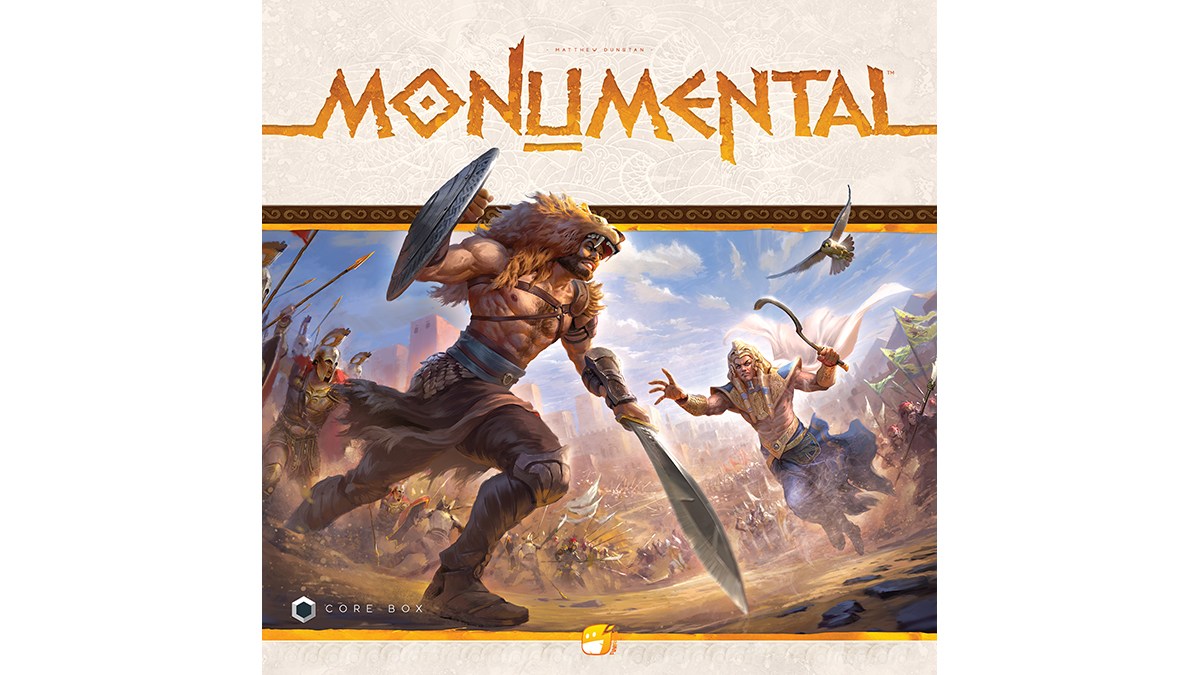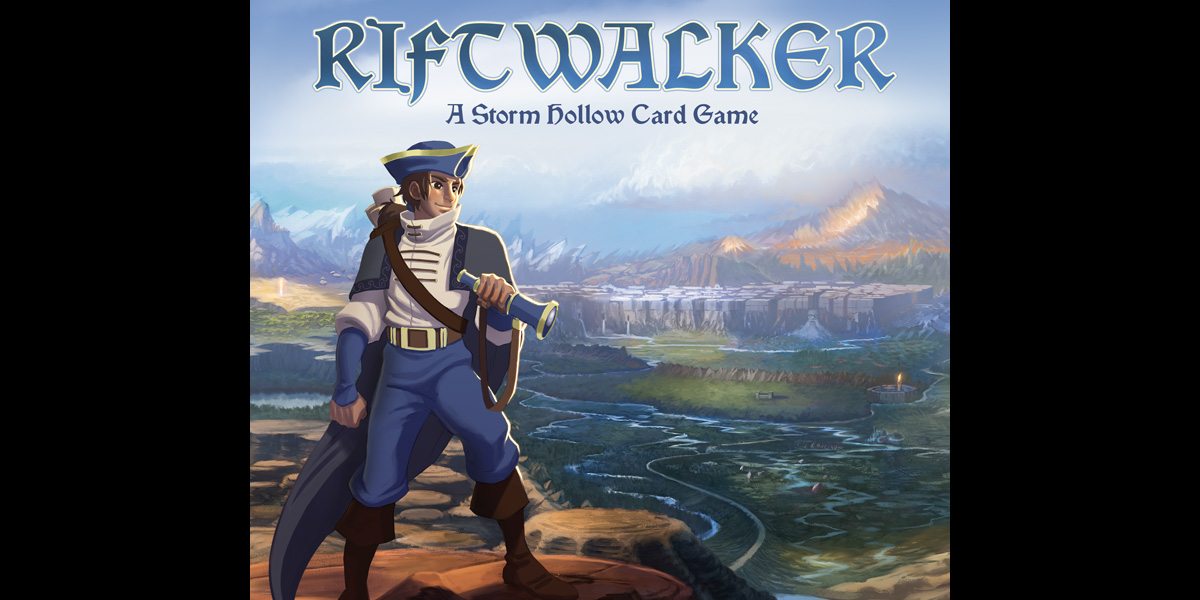Civilizations from across the ages compete to conquer lands, build wonders, and accumulate knowledge to see which of them will be the most Monumental.
What Is Monumental?
Monumental is a a civilization game for 1-4 players, ages 14+, and plays in 90-120 minutes. Designed by Matthew Dunstan and published by Funforge, the game incorporates a variety of mechanics, including 4x (Explore, Expand, Exploit, and Exterminate), deck building, and a unique “cross-tapping” mechanic. It’s currently seeking funding on Kickstarter where you can purchase the Classic Edition for $75 or the Deluxe Edition for $104. Note that Monumental is a Kickstarter exclusive and won’t be sold at retail so grab your copy now if you are interested.
New to Kickstarter? Check out our crowdfunding primer, and visit our Kickstarter curated page for more projects we love.
Monumental Components

Note: My review is based on a prototype copy, so it is subject to change and does not reflect final component quality. Many of the cards I played with did not have art on them, and I played with the classic edition so tokens only, no miniatures. However, I will say the quality of the tokens and cards were top notch, and the artwork that was included is gorgeous and vibrant. And speaking of components, this game comes with a lot.
- 70 Unit tokens (or miniatures in the deluxe edition)
- 5 Warlords (1 per civilization)
- 10 Outposts (2 per civilization)
- 10 Explorers (2 per civilization)
- 45 Soldiers (9 per civilization)
- 105 Civilization Cards
- 15 starting cards per civilization
- 25 Cultural Policy cards (5 per civilization)
- 5 Warlord cards (1 per civilization)
- 38 Development Cards
- 15 Classical Era cards (I)
- 12 Medieval Era cards (II)
- 8 Modern Era cards (III)
- 3 Era separation cards (I, II, and III)
- 30 Basic Building Cards
- 10 Archery Ranges
- 10 Laboratories
- 10 Workshops
- 20 Solo Mode Cards
- 40 two-sided tiles
- Tokens
- 13 Wonder tokens
- 20 Culture tokens
- 50 Barbarian / Free City tokens
- 25 Production tokens
- 20 Market tokens (4 of each type)
- 40 Gold Coin tokens
- 39 Plastic resource counters
- 15 red (military)
- 12 blue (science)
- 12 black (production)
- 5 Plastic construction markers
- 56 ABS miniature colored bases (Deluxe Edition only)
- 1 Rulebook
- 1 Civilization Manual
- 1 Scenario Guide
How to Play Monumental
Objective
The goal of Monumental is to become the most successful civilization by building the most wonders, gaining the most knowledge, developing cultural policies, and conquering and controlling the most provinces. In the end, the player who has acquired the most victory points is the winner.

Setup
Board setup is dependent upon the number of players. Assemble the board using the tiles and layout as shown in the instructions, placing the Barbarian/Free City tokens, Production tokens, and Market tokens on the board as indicated. Place the various resources (military, production, and science counters, and gold coin and cultural tokens) within easy reach of all players.
Take the three different types of Basic Building cards and place them into separate piles. Also sort and shuffle the Development cards by their respective eras (I, II, and III), stacking them on top of each other with era I on top. Deal the top 6 cards from the Development Deck into row, creating the Development Display. These are the starting Development cards for purchase.

Each player chooses a civilization to play, taking the corresponding Warlord, Explorers, Outposts, and Soldier tokens and places them on their capital tile. Also, take the corresponding Warlord and Cultural Policy cards. Finally, shuffle your 15 starting Civilization cards and deal them out in a 3-by-3 grid from top to bottom, and left to right. These 9 cards are your city. While setting up your city, if you deal a Knowledge card, then place the next Building card on top of it before finishing your grid. This completes the setup phase. Now it’s time to begin playing!

Activate Your City
The highlight of Monumental is its cross tapping mechanic. On your turn, you will activate one column and one row by tapping, or turning sideways, those five cards. Each card gains you a specific type of resource—military, production, and science—or has an triggered ability. If you activate a card with a Knowledge card beneath it, you get the benefit from the Knowledge card as well. Gather the appropriate counters from the resource pool. You will be able to use these to take actions during your turn; however, note that any resources that you don’t use, go back into the resource pool at the end of your turn. Use them, or lose them. The exception to the rule are Culture and Gold Coin tokens. A player may keep these to spend on a future turn.

Actions
On their turn, a player may take any of these actions, in any order, and as many times as they wish, as long as they have the resources to pay for them.
- Acquire Development or Basic Building cards: You may purchase any of the available Development or Basic Building cards, by paying the associated cost on the card. Purchased cards are placed on top of your Civilization Deck so that they will be dealt into your city on your next turn. Development cards include buildings, knowledge, and wonders. Wonder cards are special in that they have two costs printed on them. The first cost is to buy the wonder, placing it to the side instead of your on top of your deck. Once you pay the second cost, then you place it on top of your Civilization Deck and, in addition, you get to place the associated wonder token in one of your provinces. Wonder tokens provide additional defense when defending a province from attack.
- Develop Cultural Policy: Each player has 5 unique Cultural Policy cards. By spending Culture tokens, a player may develop the Cultural Policy of their choice. The first policy costs 1 Culture, the second costs 2, and so forth. Each policy provides an immediate effect as well as an on-going effect. However, each time that you develop a new policy, it covers the on-going effect of the previous one, so the order that you develop them can be very important to your game strategy.
- Conquer a Province: To conquer provinces, you have to move your warlord or soldiers into them. Each military resource allows you to move your warlord or a soldier into an enemy province, and you must move enough of your army into that province to match or exceed its defense. Each tile lists a natural defense that is added to the Barbarian token on it. For instance, if a tile has a defense of 2 and a Barbarian token with power 3 on it, then you must move at least 5 soldiers/warlord into that province to conquer it. Upon conquering that province, flip over the Barbarian token and choose one of the two rewards on the back. You now control that Province. Additionally, some provinces have Free Towns in them instead of Barbarians. To conquer these provinces you must spend the amount of resources listed on the Free City token in addition to moving enough warlord/soldiers into the province to match or exceed its natural defense. For instance, if the tile has a defense of 2 and a Free Town token showing 2 science, then you must move 2 soldiers/warlord into it as well as pay 2 science resources to conquer it. Lastly, you can conquer of province occupied by another player. Once again, you must be able to move enough soldiers/warlord to equal the defense of the tile and enemy units located there. Note that each warlord has a special ability that is activated the first time that they conquer a province each turn.
- Military Maneuver: This action allows you to spend military resources to move any of your units within provinces that you already control. For 1 military resource, 1 unit can move several tiles as long as you control them and they are connected.
- Build an Outpost: Each player has 2 outposts that they can place in a controlled province. To build an outpost, a player must have at least 3 soldiers stationed in that province. Remove 3 soldiers, placing them on your capital tile, and place an outpost in that province instead. Outposts allow you to keep control of a province without having soldiers there. In addition they provide 3 defense against attacks.
- Go Exploring: Each player also has 2 Explorers that can freely move around the board by spending military resources. Each military resource allows you to move an Explorer 1 tile. Explorers may enter any tile regardless of who currently controls it. On each turn an Explorer may pick up one Production or Market token that can be saved for future use.
- Scientific Progress: For the cost of 2 science, a player can flip the top card of their deck and activate that card. At the end of the player’s turn, this card is then discarded along with the rest of the the city cards that were activated that turn.
As you can see, there are a lot of options available. One thing to note is that gold can be spent in place of a military, science, or production resource, making it a valuable commodity since you do not lose it at the end of turn like the other resources.
End of Turn
Once a player has completed all their actions, they return any unused resources back to the resource pool, discard tapped city cards, and replenish their city by dealing new cards from their Civilization Deck into the empty spaces from top to bottom, and left to right. Additionally, shift Development cards away from the Development deck to fill any gap left by purchased cards, and then deal out new cards so that there are a total of 6 available for the next player. If no Development cards were purchased that turn, discard the one farthest away from the deck, shift the others down, and deal out a new card.
Game End
The end of game is triggered when the final Development Card is dealt. Play continues until the last player finishes their turn. Then each player receives one more turn so that all players receive an equal number of turns.
Scoring
The winner is determined by victory points, which are calculated as follows:
- Each Knowledge gained: 1 point
- Each Wonder built: 2 points
- Each Cultural Policy developed: 2 points
- Each Province controlled: 1 point
- Most Knowledge gained: 3 points
- Most Wonders built: 3 points
- Most Cultural Policies developed: 3 points
- Most Provinces controlled: 3 points
The player with the most victory points is the champion. Ties are resolved by the player with the most gold being victorious. If there is still a tie, then the player with the most Culture wins. If there is still a tie, then players share victory.

Why You Should Play Monumental
Monumental has a lot to offer. It is a 4x civilization game. It’s a deck builder. It has a unique cross-tapping mechanic that gives a player maximum flexibility each turn. All of these combine into an interesting and engaging game with good production quality and beautiful artwork. At first glance, there is a lot going on on the board, and a lot of information to assimilate. However, it only took a turn or two for everyone to grasp the gameplay. Although there are several possible choices, you are limited by the resources you can produce, and the actions are straight forward (spend a resource, do the action). I was impressed at how smooth the gameplay was and that the array of options did not cause analysis paralysis.
Monumental also has a lot of replayability built in. For starters, the core box comes with 5 different factions (Greeks, Egyptians, Vikings, Chinese, and Japanese), plus another 4 available for purchase (Amazons, Aztecs, Atlanteans, and Mughals). Each faction has a unique warlord power, Cultural Policies, and starting Civilization Deck, offering different play strategies and guaranteeing a different experience with each faction. And the variable tiles add even more replayability. While the rules provide basic board setups, you are free to create your own map. For instance, if you desire to have more player interaction and head-to-head combat, then just assemble a smaller board. Or want to make it more difficult to conquer provinces, then use tiles and Barbarian tokens with higher defenses.
I especially liked that there are several paths to victory. You can focus on military might by conquering and controlling the most provinces; or amaze the world with your collection of wonders; or become the smartest civilization by gathering knowledge; or maybe the best strategy is a combination of these. The cross-tapping mechanic plays into this beautifully by allowing a player flexibility on each turn to activate the cards that will most benefit their strategy at that moment.
In addition to having fun and creative central mechanics, Monumental also does the small things well. Like any good deck builder, the game provides a way to cull your deck through the archiving mechanic. Certain cards, when activated, allow you to archive, or remove, one of your non-activated city cards from the game. Thus removing less powerful cards from your deck so that you will be able to activate your powerful ones more frequently. Also, the fact that all players get the same number of turns is a nice touch. It’s never fun when a game ends right before you are about to have a big turn that might have solidified your victory, but in Monumental, when the end game triggers, everyone still has one last chance to go big.
The last thing I want to touch on is the solo mode. My prototype didn’t have the Solo Deck, so I was unable to test this out, but I am always more interested in games that provide a good solo experience since breaking free for a game night doesn’t happen very often. While my hunch is that Monumental is best enjoyed with other players, the option to setup a solo challenge is appealing. The solo mode setup is the same as for a 2-player game; however, you use the Solo Deck to control the automona’s actions. You take your turn as normal, and then on the automona’s turn, flip a card from the Solo Deck and perform those actions. It’s that simple. You add up victory points at the end to see who had the better score, you or the autonoma.
Overall, Monumental looks like a great civilization game, with or without the miniatures. I am looking forward to playing the final version and call dibs on the Greeks. What civilization do you want to play?
![]() To subscribe to GeekDad’s tabletop gaming coverage, please copy this link and add it to your RSS reader.
To subscribe to GeekDad’s tabletop gaming coverage, please copy this link and add it to your RSS reader.
Click here to see all our tabletop game reviews.
Disclosure: GeekDad received a copy of this game for review purposes.






Things which are making Monumental a wonderful game are that it is incorporating a very great of mechanics. Funforge have published their masterpiece game this time. Click https://eduzaurus.com/free-essay-samples/cyber-bullying/ website to write essay on cyber bullying. Therefore, I am interested in purchasing its Deluxe Edition.